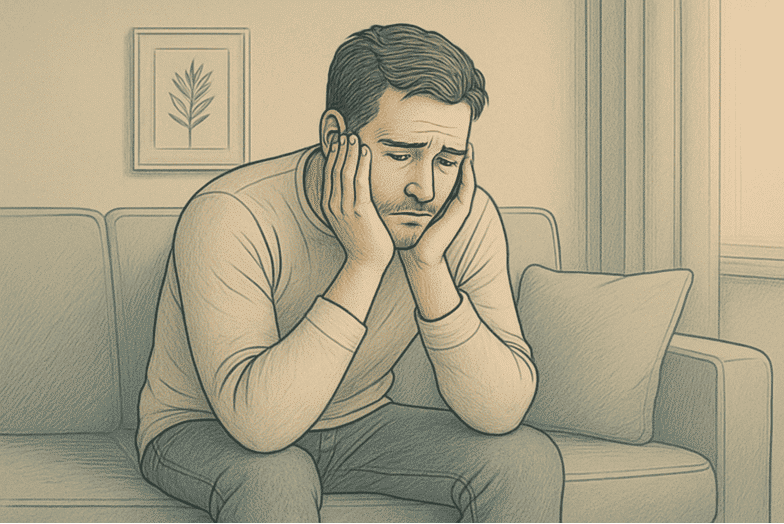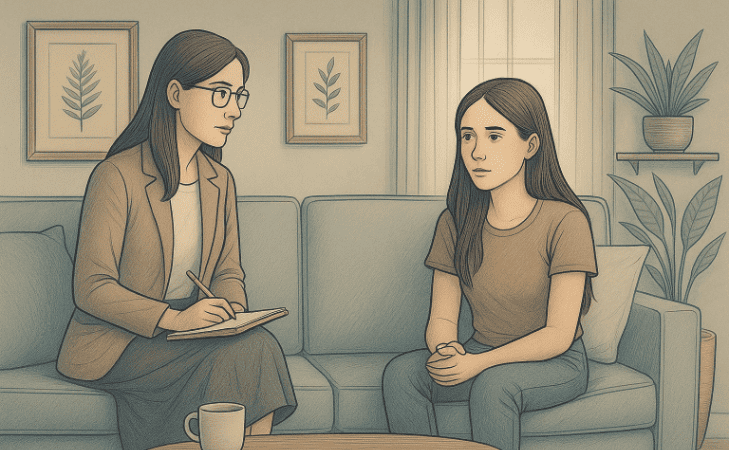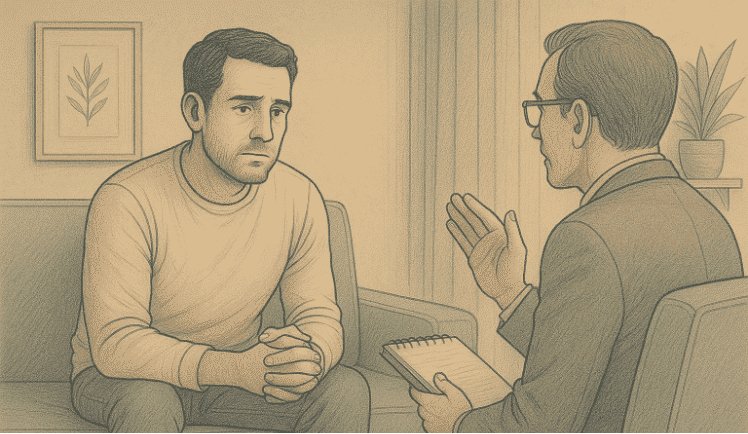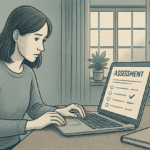
Key Takeaways
- Cognitive Behavioral Therapy dramatically improves bipolar disorder outcomes when combined with medication, reducing relapse rates by up to 50%.
- CBT helps patients identify harmful thought patterns that can trigger mood episodes and develop personalized strategies to manage them.
- Unlike medication alone, CBT provides practical tools for long-term symptom management and improved quality of life
- The most effective CBT approaches for bipolar disorder include mood monitoring, early warning sign recognition, and structured routine development.
- Mission Connection Healthcare offers evidence-based CBT programs specifically designed for bipolar disorder across California, Virginia, and Minnesota locations, with experienced clinicians who coordinate care with psychiatrists and provide customized treatment plans through various program intensities.
Scientific Evidence: CBT for Bipolar Disorder
The scientific evidence supporting Cognitive Behavioral Therapy (CBT) for bipolar disorder is substantial and growing. Meta-analyses of randomized controlled trials consistently show that CBT, when used as an adjunct to mood stabilizers, significantly reduces relapse rates, improves depressive symptoms, decreases mania severity, and enhances overall psychosocial functioning. One comprehensive study demonstrated that CBT sessions that are 90 minutes or longer were effective against depression and mania symptoms among those with bipolar disorder, and the relapse was also much lower.
What makes CBT particularly valuable is its focus on practical, real-world applications. Unlike some therapeutic approaches that primarily explore past experiences, CBT equips patients with concrete skills they can implement immediately. These include identifying early warning signs of mood episodes, challenging distorted thinking patterns, establishing healthy routines, and developing effective stress management techniques that can prevent minor symptoms from escalating into full-blown episodes.
CBT’s effectiveness extends beyond symptom management to address quality of life issues that medication cannot. Individuals report improvements in relationships, work performance, and overall life satisfaction following CBT treatment. By developing stronger coping mechanisms and a better understanding of their condition, individuals with bipolar disorder gain confidence in their ability to manage symptoms and face life’s challenges more effectively.
Mission Connection offers flexible outpatient care for adults needing more than weekly therapy. Our in-person and telehealth programs include individual, group, and experiential therapy, along with psychiatric care and medication management.
We treat anxiety, depression, trauma, and bipolar disorder using evidence-based approaches like CBT, DBT, mindfulness, and trauma-focused therapies. Designed to fit into daily life, our services provide consistent support without requiring residential care.
What CBT Does for Bipolar Disorder

CBT helps patients recognize how certain thought patterns can trigger or worsen mood episodes, teaching them to identify and challenge these unhelpful cognitions before they lead to symptomatic behavior.
The goal isn’t to eliminate all symptoms but to reduce their frequency and intensity while improving the patient’s ability to manage those that do occur. Unlike medication, which primarily addresses the biological aspects of bipolar disorder, CBT tackles the psychological components.
Identifying Harmful Thought Patterns
A cornerstone of CBT for bipolar disorder is learning to recognize and challenge harmful thought patterns that can trigger or intensify mood episodes.
Patients with bipolar disorder often develop characteristic thought distortions during different phases of their illness. During depressive episodes, they might catastrophize minor setbacks or filter out positive experiences. During manic or hypomanic states, they might overestimate their capabilities or minimize potential risks of their behavior. CBT helps individuals in this state to:
- Recognize connections between thoughts, feelings, and bipolar symptoms
- Teaches practical skills for interrupting negative thought cycles before they trigger episodes
- Provides structure and routine that can help stabilize mood fluctuations
- Improves communication skills to strengthen support networks
- Addresses sleep disturbances that often accompany and exacerbate bipolar symptoms
Addressing Issues Medication Can’t Solve
While medications effectively stabilize biochemical imbalances, they can’t teach the skills needed to navigate life with bipolar disorder. CBT fills this crucial gap by addressing the psychological and behavioral aspects of the condition that pills simply cannot reach.
Through structured therapy sessions, patients learn to identify problematic thought patterns, develop healthier coping mechanisms, and build resilience against stress factors that might trigger episodes.
5 Key CBT Techniques for Bipolar Management
1. Mood Monitoring and Awareness
Daily mood tracking forms the foundation of effective CBT for bipolar disorder. Patients learn to systematically record their emotional states, energy levels, sleep patterns, and other relevant factors using mood charts or digital apps designed for this purpose.
This practice develops metacognition, the ability to observe one’s own mental states, which research shows is often impaired during mood episodes.
2. Recognizing Early Warning Signs
Each person with bipolar disorder develops a unique “signature” of early warning signs that precede mood episodes. Through CBT, patients learn to identify their personal red flags, such as decreased need for sleep before mania or social withdrawal before depression—often weeks before severe symptoms emerge.
This early recognition window is critical, as intervention during the prodromal phase is significantly more effective than waiting until an episode is fully developed.
3. Challenging Negative Thought Patterns
Cognitive restructuring teaches patients to identify, evaluate, and modify distorted thinking patterns that contribute to mood instability. During therapy sessions, you learn to recognize common thought distortions such as all-or-nothing thinking, catastrophizing, or emotional reasoning that can amplify mood symptoms.
The therapist guides you through a systematic process of examining evidence for and against these thoughts and developing more balanced alternatives.
4. Developing Healthy Routines
Establishing regular daily routines provides a stabilizing framework that helps regulate the biological rhythms often disrupted in bipolar disorder. CBT places particular emphasis on sleep hygiene, meal timing, exercise schedules, and social engagement patterns that support mood stability.
Therapists work with patients to develop personalized routines that are both stabilizing and sustainable, gradually building habits that serve as protective factors against mood instability.
5. Stress Management Strategies
Stress is a well-documented trigger for bipolar episodes, making effective stress management essential for long-term stability. CBT provides practical techniques for reducing and managing stress, including mindfulness practices, progressive muscle relaxation, time management skills, and assertive communication strategies.
These approaches help lower overall stress levels while building resilience against unavoidable stressors.
Finding the Right CBT Therapist

Qualifications to Look For
When seeking a qualified CBT therapist for bipolar disorder, look for practitioners with specific credentials that indicate specialized training. Ideally, your therapist should have a doctorate or master’s degree in psychology, counseling, or social work, along with specific certification or training in Cognitive Behavioral Therapy.
The most qualified therapists will have completed specialized training programs in bipolar-specific CBT protocols and maintain membership in professional organizations.
Questions to Ask Before Starting
Before beginning CBT for bipolar disorder, ask potential therapists about their experience specifically with bipolar disorder, not just depression or anxiety. Inquire about their approach to coordinating care with psychiatrists, their protocols for managing crisis situations, and their familiarity with the latest research on CBT for bipolar disorder.
It’s also important to ask about practical matters like session frequency, duration of treatment, homework expectations, and their availability between sessions if you notice early warning signs.
These questions help you assess the therapist’s expertise and establish whether their approach aligns with your needs and preferences.
Mission Connection Healthcare’s Specialized Approach to CBT for Bipolar Disorder Success
At Mission Connection Healthcare, our specialized CBT programs are specifically designed for bipolar disorder management, delivered by clinicians with extensive experience in mood disorder treatment. We understand that bipolar disorder affects each person differently, which is why our approach begins with comprehensive assessment and personalized treatment planning that addresses your unique symptom patterns and triggers.
Unlike generic therapy approaches, our bipolar-focused CBT coordinates seamlessly with psychiatric care to ensure integrated treatment across our California, Virginia, and Washington state locations. Our program options range from weekly outpatient therapy sessions to intensive outpatient programs and telehealth treatment, allowing you to access appropriate care intensity as your needs change throughout recovery.

Understanding that accessing mental health care can feel overwhelming, our insurance team provides insurance verification support and benefits coordination, removing financial barriers that might prevent you from beginning this evidence-based treatment approach.
Call Today 866-833-1822.
Frequently Asked Questions
Can CBT replace my bipolar medication completely?
CBT is designed to complement, not replace, medication for bipolar disorder. Research consistently shows that combined treatment – mood stabilizers for biological aspects plus CBT for psychological components – produces significantly better outcomes than either approach alone.
While CBT may help reduce reliance on certain additional medications like sleep aids or anxiety medications, any medication changes should always be supervised by a psychiatrist based on your individual progress and needs.
What makes CBT different from other therapies for bipolar disorder?
CBT focuses specifically on the connection between thoughts, feelings, and behaviors, teaching practical skills patients can use immediately to manage symptoms.
Unlike therapies that primarily explore past experiences, CBT provides concrete tools like mood tracking, thought challenging, and routine development that directly address bipolar-specific challenges. Its structured, evidence-based approach has the strongest research support for reducing relapse rates and improving long-term functioning in bipolar disorder.
Will my insurance cover CBT treatment for bipolar disorder?
Most health insurance plans cover evidence-based psychotherapies like CBT for diagnosed mental health conditions, including bipolar disorder, thanks to mental health parity laws.
Coverage details vary between plans regarding session limits, provider networks, and copayments. Before starting treatment, verify your specific benefits by contacting your insurance provider about CBT coverage, including if you need referrals, what your out-of-pocket costs will be, and any annual session limitations.
How does Mission Connection Healthcare customize CBT treatment for individual bipolar patients?
Mission Connection Healthcare’s experienced clinicians conduct comprehensive assessments to understand each patient’s unique symptom patterns, triggers, and treatment history before developing personalized CBT programs.
Our approach includes coordinating with psychiatrists for integrated care, offering various program intensities from outpatient to residential settings, and incorporating complementary therapies like group sessions and family support.








